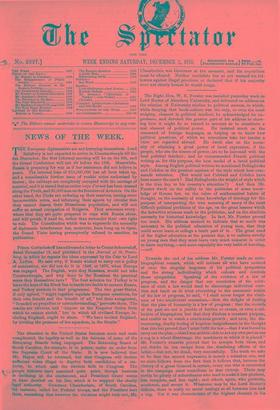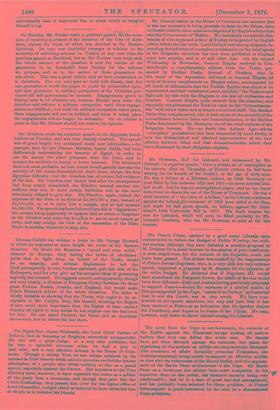Towards the end of his address Mr. Forster made an
auto- biographical remark, which will interest all who have noticed at once the singular largeness of his political sympathies and the strong individuality which colours and controls those sympathies. Speaking of the evidence of a law of progress, and the danger that our conviction of the exist- ence of such a law would tend to discourage individual exer- tion and teach us to trust everything to the automatic action of the law of progress, he said, " I shall never forget the vivid- ness of two intellectual sensations,—first, the delight of finding that the plan of humanity is a law of progress ; that the records of the past are not a jumble of battles or events, or even a col- lection of biographies, but that they disclose a constant purpose, and enable us to watch a continuous growth ; and next, the dis- heartening, deadly feeling of hopeless insignificance in the thought that this but proved that I must fulfil the law,—that I was forced to rany out the plan,—that I was as little able to act my own part as can a cog in a wheel disarrange the machinery in which it is placed." Mr. Forster's remarks proved that he accepts both ideas, and yet thinks he can escape from the deadening effects of the latter,—but not, we think, very successfully. The truth we take to be that the second impression is merely a mistaken one, and no more follows from the first than it follows that, because the victory of a great General is certain, every one who is concerned in the campaign must contribute to that victory. There may surily be plenty of subordinates who tend to make it less glorious, less complete, and less rapid ; and others, again, who promote, accelerate, and secure it. Whatever may be the Lord Rector's defects, there is really no moral analogy at all between him and a cog. Yet it was characteristic of the highest element in his
individuality that it depressed him so much vainly to imagine himself a cog.



































